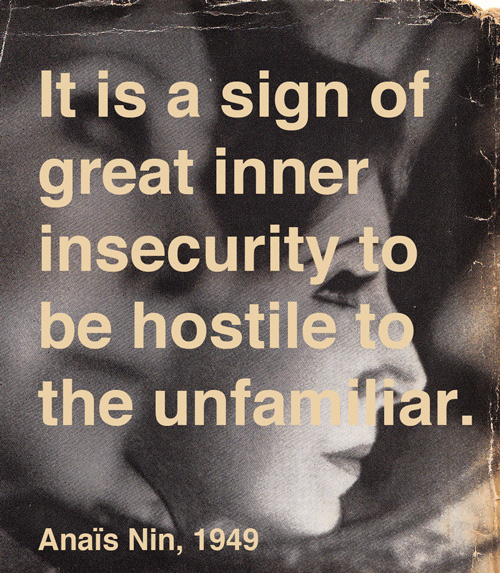Anaïs Nin on Embracing the Unfamiliar
by Maria Popova
“It is a sign of great inner insecurity to be hostile to the unfamiliar.”
 We’ve already seen that life is about living the questions, that the unknown is what drives science, and that the most beautiful experience we can have is the mysterious. John Keats wrote of this art of remaining in doubt “without any irritable reaching after fact & reason” and famously termed it“negative capability.” But count on Anaïs Ninto articulate familiar truths in the most exquisitely poetic way possible, peeling away at the most profound and aspirational aspects of what it means to be human.
We’ve already seen that life is about living the questions, that the unknown is what drives science, and that the most beautiful experience we can have is the mysterious. John Keats wrote of this art of remaining in doubt “without any irritable reaching after fact & reason” and famously termed it“negative capability.” But count on Anaïs Ninto articulate familiar truths in the most exquisitely poetic way possible, peeling away at the most profound and aspirational aspects of what it means to be human.
In a diary entry from the winter of 1949-1950, found in The Diary of Anaïs Nin, Vol. 5: 1947-1955 (public library), which gave us Nin’s whimsical antidote to city life and her poignant meditation oncharacter, parenting, and personal responsibility, she observes:
Educators do all in their power to prepare you to enjoy reading after college. It is right that you should read according to your temperament, occupations, hobbies, and vocations. But it is a sign of great inner insecurity to be hostile to the unfamiliar, unwilling to explore the unfamiliar. In science, we respect the research worker. In literature, we should not always read the books blessed by the majority. This trend is reflected in such absurd announcements as “the death of the novel,” “the last of the romantics,” “the last of the Bohemians,” when we know that these are continuous trends which evolve and merely change form. The suppression of inner patterns in favor of patterns created by society is dangerous to us. Artistic revolt, innovation, experiment should not be met with hostility. They may disturb an established order or an artificial conventionality, but they may rescue us from death in life, from robot life, from boredom, from loss of the self, from enslavement.When we totally accept a pattern not made by us, not truly our own, we wither and die. People’s conventional structure is often a façade. Under the most rigid conventionality there is often an individual, a human being with original thoughts or inventive fantasy, which he does not dare expose for fear of ridicule, and this is what the writer and artist are willing to do for us. They are guides and map makers to greater sincerity. They are useful, in fact indispensable, to the community. They keep before our eyes the variations which make human beings so interesting. The men who built America were the genuine physical adventurers in a physical world. This world once built, we need adventurers in the realm of art and science. If we suppress the adventure of the spirit, we will have the anarchist and the rebel, who will burst out from too narrow confines in the form of violence and crime.
Also from Nin’s diaries: why emotional excess is essential to creativity, Paris vs. New York, what makes a great city, and hand-lettered wisdom on life.


Nenhum comentário:
Postar um comentário